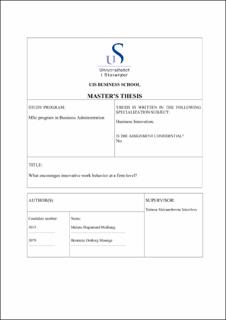| dc.description.abstract | This thesis aims to determine what positively influences innovative work behavior and answering the research question, "What encourages innovative work behavior at a firm- level?". Based on a literature review and research findings, we found that organizational climate, employability, job demands, effort-reward fairness, and work engagement were expected to have a positive impact on IWB. To be able to test the relationship between these variables and IWB, we collected data through a questionnaire with already validated measurements from previous research. The questionnaire was sent to 401 employees at Haugaland kraft, and the final sample consisted of 123 employees. Analysis of the data demonstrated that several variables were correlated with IWB, which were: educational level, humanitarian- and economical background, regulative & normative, anticipation and optimization, occupational expertise & corporate sense, personal flexibility, and job demands. The final regression model reveals that all the variables that are included explain 44,5% (***) of the variance in IWB. The results indicate that all educational backgrounds, regulative & normative (organizational climate), anticipation and optimization (employability), and a high level of job demands have a positive impact on innovative work behavior. The main predictor is employability, which explaining 22,1% (***) of the variance in IWB, while organizational climate and job demands explain 6,5% (*) and 5,3% (***), respectively. Based on the results, it shows that management can encourage IWB by rules and policies (regulative), which might influence whether employees experience that contributing towards innovation is highly valued (normative). Further, the result anticipation and optimization indicate that employees who continuously develop their competencies and can apply their newly acquired knowledge and skills are encouraging IWB. The result of job demands is in line with previous research findings, which shows that a high level of job demands is a trigger for IWB. Thus, we conclude that organizational climate (regulative & normative), employability (anticipation & optimization), and a high level of job demands encourage innovative work behavior at Haugaland Kraft. | en_US |
